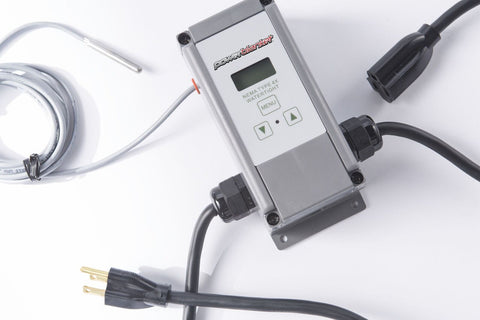Navigating the Essentials of Bulk Container Heating
In industrial storage and transportation, maintaining the desired temperature of temperature-sensitive materials is not just a matter of quality but, often, of necessity. Enter the world of intermediate bulk container heaters, a pivotal aspect of modern logistics and storage solutions. This article delves into the essentials of heating solutions for intermediate bulk containers (IBC), spotlighting the technologies and practices that ensure your materials remain optimal.
The Backbone of Industrial Storage: A Closer Look at IBCs
Intermediate bulk containers, or IBCs, are the workhorses of the storage and transportation industry. Designed to store and transport large quantities of liquids, semisolids, and granulated substances, they are crucial for industries ranging from chemicals to food products. Given their versatility, ensuring these containers maintain a controlled environment, especially for temperature-sensitive materials, is essential. This section will explore the foundational role of IBCs and the importance of maintaining precise temperatures.
The Science of Heating Bulk Containers
Why heat bulk containers? From preventing the crystallization of honey to maintaining the fluidity of industrial oils, heating ensures that materials retain their desired consistency and quality. The key to effective heating lies in technologies such as IBC heaters and heating jackets, which offer uniform heating essential for viscosity control and freeze protection. Let's explore how these technologies keep materials at their perfect solution, regardless of external temperatures.
Types of Heating Solutions
The quest for the perfect heating solution for bulk containers leads to a variety of options, each suited to different needs and applications. The choices are ample, from silicone heaters that wrap around the container, providing gentle yet effective heat, to insulated heating blankets that cover the entire IBC tote. This section will guide you through selecting the ideal heater, considering factors such as tank size, the material stored, and specific heating requirements to ensure efficient and uniform heating.
Key Technologies in Intermediate Bulk Container Heaters
Advancements in heating technologies have revolutionized the way we approach heating IBCs. Two mainstays in this arena are heating jackets and IBC heaters, each offering unique benefits to suit different requirements. Heating jackets are versatile solutions that wrap around containers, providing uniform heating and excellent viscosity control. They're particularly useful for materials with thick viscosity or those requiring freeze protection. On the other hand, IBC heaters cater specifically to Intermediate Bulk Containers, ensuring they maintain the desired temperature efficiently and safely.
Selecting the Right Heating Solution
The key to effective temperature management lies in choosing the right heating solution. This decision hinges on several factors, including the type of material stored (e.g., food, chemicals, honey, oil), the container size, and specific heating requirements. For instance, IBC totes storing expensive materials that are temperature sensitive demand a solution that offers precise temperature control and efficient heating. This might mean opting for an IBC heating jacket that provides easy access and uniform heating, thereby ensuring the material's quality is preserved without significant heat loss.
Types of Heating Solutions
Among the array of heating solutions, three types stand out for their efficiency and adaptability:
-
Silicone Heaters: Best suited for containers requiring gentle, consistent heat. They are durable and can be customized to fit various container sizes and shapes.
-
Wrap-around Heating Blankets: Ideal for IBC totes and other bulk containers, these blankets offer flexible heating options with adjustable temperature settings and straps for secure attachment.
-
Insulating Jackets: These add an extra layer of protection against heat loss, making the heating process more energy-efficient. They're particularly useful for storing and transporting fluids like syrup or oil, where maintaining a consistent viscosity is crucial.
Practical Applications and Benefits
Intermediate bulk container heaters are not a one-size-fits-all solution; they vary significantly across industries and materials. For industries dealing with food products like sugar and honey, maintaining a fluid consistency is essential for easy discharge and processing. In the chemical industry, preventing freezing and controlling viscosity is vital for safety and efficiency. The benefits of implementing the right heating solution are manifold, from preventing product degradation to enhancing safety and flow.
Installation and Maintenance Tips
For those investing in IBC heaters or heating jackets, installation and maintenance are key to ensuring longevity and performance. It's crucial to ensure that the heater or jacket is correctly sized for the IBC tote or container to prevent heat loss and overheating. Regular checks for wear and tear, as well as monitoring for uniform heating, will help maintain optimal performance. Moreover, selecting solutions with easy access for maintenance can save time and reduce operational downtime.
Maximizing Efficiency and Safety
Efficiency and safety go hand in hand when it comes to heating bulk containers. Heaters and jackets that offer adjustable temperature controls and built-in safety features can prevent overheating and burning, protecting both the material and the container. Moreover, opting for energy-efficient solutions can significantly reduce operational costs while contributing to environmental sustainability.

Wrapping Up: The Critical Role of Effective Heating for an Intermediate Bulk Container
In the vast and varied landscape of industrial storage and transportation, IBC tote heating emerges as a critical solution for maintaining the integrity and quality of stored materials. The market offers a plethora of options, from IBC heaters to heating jackets, tailored to meet specific needs and challenges. By carefully selecting and maintaining the right heating solution, businesses can achieve optimal efficiency, safety, and product quality, ensuring smooth and successful operations.







